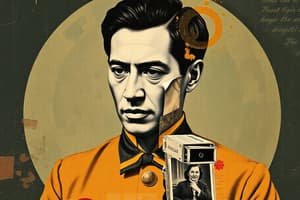Podcast
Questions and Answers
Where was Jose Rizal born?
Where was Jose Rizal born?
- Cebu, Philippines
- Calamba, Laguna, Philippines (correct)
- Bacolod, Philippines
- Manila, Philippines
At what age did Jose Rizal enroll in the University of Santo Tomas to study Medicine?
At what age did Jose Rizal enroll in the University of Santo Tomas to study Medicine?
- 18
- 16 (correct)
- 20
- 11
What subjects did Jose Rizal excel in at the Ateneo Municipal de Manila?
What subjects did Jose Rizal excel in at the Ateneo Municipal de Manila?
- History, Geography, and Arts
- Music, Drama, and Sports
- Mathematics, Science, and Languages (correct)
- Economics, Politics, and Law
In which year did Jose Rizal earn a degree in Civil Engineering?
In which year did Jose Rizal earn a degree in Civil Engineering?
What made Jose Rizal widely celebrated worldwide?
What made Jose Rizal widely celebrated worldwide?
What was the title of Jose Rizal's first novel?
What was the title of Jose Rizal's first novel?
In which year was Jose Rizal arrested on charges of sedition?
In which year was Jose Rizal arrested on charges of sedition?
Which organization did Jose Rizal found in 1888 to promote Filipino unity and self-improvement?
Which organization did Jose Rizal found in 1888 to promote Filipino unity and self-improvement?
Which poem by Jose Rizal has been etched into the Filipino cultural consciousness?
Which poem by Jose Rizal has been etched into the Filipino cultural consciousness?
Where is the memorial dedicated to Jose Rizal located?
Where is the memorial dedicated to Jose Rizal located?
Flashcards are hidden until you start studying
Study Notes
Jose Rizal's Life: A Journey of Learning, Literature, and Legacy
Jose Rizal, a Filipino national hero, was a true Renaissance man, brimming with intellectual curiosity and a passion for progress. This article will explore his life's subtopics, delving into his early life, education, literary works, and enduring legacy—a testament to his unwavering dedication to the advancement of his beloved nation.
Early Life
Jose Rizal was born on June 19, 1861, in Calamba, Laguna, Philippines, to Francisco Mercado Rizal, a well-respected lawyer, and Teodora Alonso Realonda, a woman of Chinese and Spanish descent. Despite having a privileged upbringing, Rizal sought truth and justice, which he would later incorporate into his writing and activism.
Education
Jose Rizal's thirst for knowledge was insatiable, leading him to enroll in the Ateneo Municipal de Manila (now University of Santo Tomas) at the age of 11, where he excelled in mathematics, science, and languages. In 1877, at the age of 16, he left for Spain to study Medicine at the University of Santo Tomas and later transferred to the University of Madrid in 1878. Here, he continued to excel, winning awards in French, Spanish, and Philosophy, as well as embracing his love for literature. In 1882, he earned a degree in Civil Engineering and returned to the Philippines to work for the government.
Literary Works
Rizal's literary prowess transcended borders, and his works were celebrated worldwide. His first novel, Noli Me Tangere (Touch Me Not), published in 1887, is a scathing critique of Spanish colonial rule in the Philippines. The book's success led to the publication of his second novel, El Filibusterismo (The Rebel) in 1891. These novels exposed the injustices of colonial rule and became seminal texts in the Philippine revolution.
Rizal was also a prolific poet and essayist, writing in both Spanish and Tagalog. His poetry, such as "Mi Ultimo Adios" (My Last Farewell), "Sa Aking Mga Kababayan" (To My Countrymen), and "Estero," has been etched into the Filipino cultural consciousness. His essays, like "The Filipinos and Spanish Rule" and "The Indolence of the Filipinos," continue to challenge and inspire readers.
Political Activities
Rizal's literary works were not his only forms of activism. He was also a tireless advocate for reform, working to improve Filipino education and governance. In 1888, he founded La Liga Filipina (The Philippine League), an organization dedicated to promoting Filipino unity and self-improvement. Rizal's efforts, however, were not without consequence, and he was arrested in 1892 on charges of sedition. Despite his innocence, Rizal was exiled to Dapitan, a small town in Mindanao, where he continued his work and established schools for the local population.
Legacy
Jose Rizal's legacy is as enduring as the ideas he championed. His works continue to inspire readers and writers alike, and his vision of a free and independent Philippines remains as relevant today as it did in the 19th century. His literary achievements and political activism have secured his place in history, and his memorial, the Rizal Shrine in Luneta Park, Manila, is a testament to the impact he had on his nation.
In conclusion, Jose Rizal's life was a testament to the power of education, literature, and activism. His journey is a reminder that one person's dedication to truth and justice can lead to lasting change. As we continue to explore his subtopics, we are reminded of the importance of learning, creativity, and spirit in shaping our world.
Studying That Suits You
Use AI to generate personalized quizzes and flashcards to suit your learning preferences.




